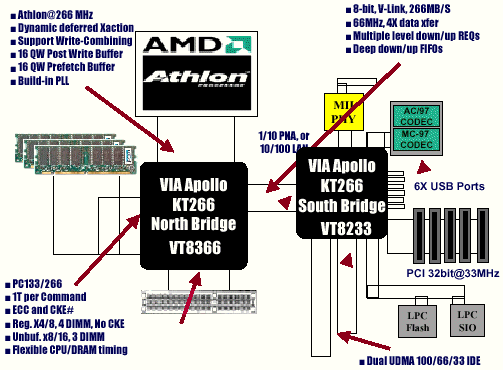VIA's DDR-Runner For Athlon - The Apollo KT266 Chipset
The Specifications Of VIA's Apollo KT266
As you can see from the picture above, the Apollo KT266 chipset consists of the VT8366 north bridge and the VT8233 south bridge, which we already know from VIA's Apollo Pro 266 Pentium III DDR-chipset . The main catch of Apollo KT266 in comparison to its predecessor KT133(A) is the new south bridge and its connection to the north bridge via VIA's "V-Link", a 8-bit wide data path clocked at 133 MHz, double-pumped and thus capable to transfer data at up to 266 MB/s. Previous chipsets used the PCI-bus as the link between north and south bridge, which only provides 133 MB/s, that needed to be shared with all the other PCI-devices. V-Link is obviously VIA's version of Intel's "hub-architecure", which uses a similar connection between north and south bridge.
Besides this new feature KT266 offers support of DDR-SDRAM as well as support of the already known memory types SDR SDRAM (up to PC133) and virtual channel SDRAM (VCM). This wide support of memory types can also be found in ALi's "unmagic" MaGiK1 DDR-chipset, while AMD's 760 is a true DDR-only solution, that does not care for any slower memory type.
The VT8233 south bridge supports all the goodies found in today's south bridges, such as ATA100, AC-97, MC-97, six USB-ports and integrated network MAC for an external PHY that offers 100/10 Ethernet connectivity. Finally it comes with support of AMD's PowerNow! Technology, which makes it useful for mobile use, as e.g. in notebooks.
From the technological point of view, VIA's Apollo KT266 gives a very good impression, while making it look a worthy competitor to AMD's 760 chipset. However, the proof is in the pudding and we will have to see if KT266 can also provide proper performance besides all those nifty features.
Get Tom's Hardware's best news and in-depth reviews, straight to your inbox.
Current page: The Specifications Of VIA's Apollo KT266
Prev Page Introduction Next Page The Sample Motherboard - MSI's K7T266 Pro MS6380